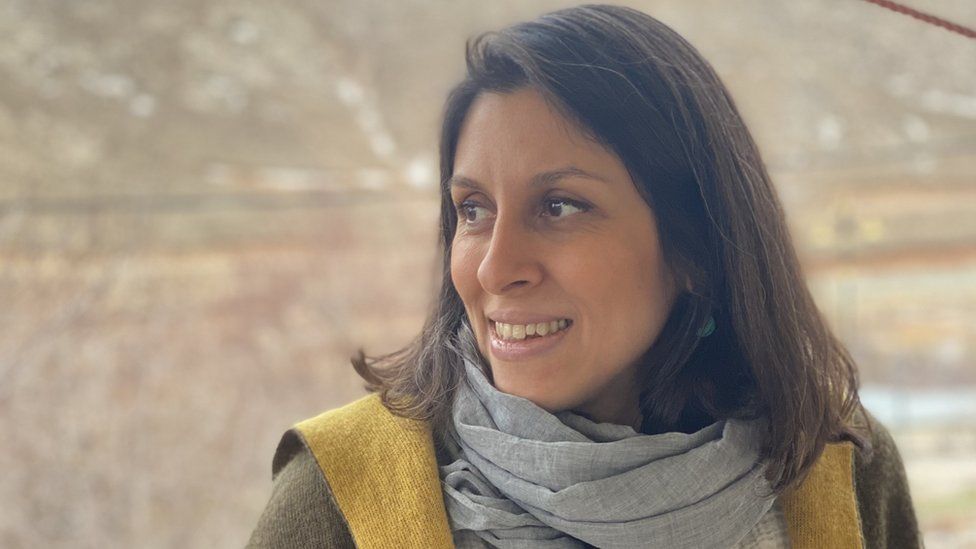Nazanin Zaghari-Ratcliffe husband talks to Truss about detained wife
- Published

Nazanin Zaghari-Ratcliffe's husband, Richard Ratcliffe, has said he has already discussed his wife's case with new foreign secretary Liz Truss.
Mrs Zaghari-Ratcliffe, a 43-year-old mother-of-one from London, has been detained in Iran since 2016.
She is serving the second of two prison sentences, this one on parole after being convicted of propaganda against the Iranian regime.
Mr Ratcliffe said stopping her coming home amounted to "hostage-taking".
Speaking to BBC One's Andrew Marr Show earlier about his continuing campaign to secure the freedom of his wife and allow her home to see her young daughter, Mr Ratcliffe revealed that he was to speak to the foreign secretary by telephone on Sunday.
He said he hoped that Ms Truss, who was only appointed in her new role on Wednesday, would be able to talk to her Iranian counterpart during the UN's General Assembly in New York this week.
Speaking after the phone call, Mr Ratcliffe said he had urged Ms Truss to take action to deter state hostage-taking, which he described as "cost free" for Iran.
But he also called for a resolution of the £400 million military debt which the UK has owed Iran for decades.
"I said it needed carrot and stick - that, as I had told her predecessors, they needed to address the debt if Nazanin is going to come home, and that they needed to take steps to address Iran's hostage diplomacy - to disincentivise Iran from continuing to do it."
Mr Ratcliffe has said that he wants to see "firm" and "clear steps" taken against Iran because of the detention of his wife and other British nationals.
Mrs Zaghari-Ratcliffe, who has dual British and Iranian citizenship, was first jailed in Tehran in 2016 on spying charges, which she has always denied.
Mr Ratcliffe said prior to his talks with Ms Truss that he would pass on the names of 10 people he accuses of being involved with "hostage-taking" in Iran - it is unclear if he has done that.
Mrs Zaghari-Ratcliffe and her family have reportedly been told by Iranian authorities that she is being detained because of the UK's failure to pay its outstanding debt to Iran, rather than the criminal charge.
Mr Ratcliffe said: "One of the key problems I feel these past years is there's been no cost for the Iranian side to carry on holding Nazanin, to carry on holding others, and so we've seen that now there are more British citizens in prison than there were when Nazanin was first taken."
The chief executive of Amnesty International UK, Sacha Deshmukh, said: "The plight of Nazanin Zaghari-Ratcliffe, Anoosheh Ashoori and other UK nationals held in Iran has extended across the last four foreign secretaries. It's long past time that the UK finally brought this deeply distressing episode to an end".
However, Mr Ratcliffe said that it was "a positive sign" to be speaking with the foreign secretary "two days into the job".
Boris Johnson was the foreign secretary when Nazanin was initially detained by Iran. He later had to apologise for remarks that the family believed made the situation worse.
In May, Ms Truss's predecessor Dominic Raab said that Iran's treatment of Mrs Zaghari-Ratcliffe amounted to "torture" and that its government was now using her in "a cat-and-mouse game" for diplomatic leverage.
He said there was an "obligation on Iran to release her immediately and without condition".
Richard Ratcliffe: Nazanin speaks to her daughter most days, while under house arrest in Iran
Mrs Zaghari-Ratcliffe's parole is pending an appeal over her second prison sentence.
She is staying with her mother in Iran and has not seen her daughter, Gabriella, in two years.
She speaks to her daughter regularly but Mr Ratcliffe is aware the there is a "consequence" to mother and daughter spending a long time apart.
But he said it is not "like when in prison", the family is able to speak to each other "most days".
Uncertainty about the court ruling has led to "real up and downs" and the situation has been "really hard", Mr Ratcliffe told the BBC.
Related Topics
- Published2 May 2021